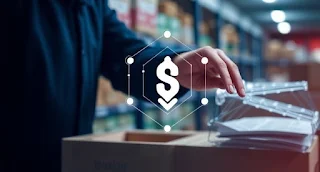Search This Blog
Streamline productivity, balance wellness, and achieve goals with versatile solutions for work, life, and success
Featured
- Get link
- X
- Other Apps
Enhancing Supply Chain Traceability with Blockchain Technology
Enhancing Supply Chain Traceability with Blockchain Technology
Introduction
 |
| Enhancing Supply Chain Traceability w Blockchain Technology |
In today’s fast-paced and interconnected economy, ensuring transparency and accountability in supply chains is vital. However, traditional methods often fall short, leading to issues like fraud, inefficiencies, and a lack of consumer trust. Blockchain technology presents a groundbreaking solution to these challenges by enabling end-to-end traceability in supply chains. This article will explore how blockchain improves supply chain transparency, efficiency, and accountability, offering insights into practical applications across industries like food, pharmaceuticals, and fashion.
Why Supply Chains Need Blockchain
 |
| Supply Chains Need Blockchain |
Modern supply chains face a host of challenges including fraud, counterfeiting, and lack of visibility. These issues not only affect business efficiency but also impact customer trust. Blockchain, a secure and decentralized ledger system, enables real-time tracking and ensures data integrity at every stage of the supply chain. By providing an unalterable record of each transaction, blockchain can revolutionize supply chain management.
Benefits of Blockchain for Supply Chain Traceability
1. Transparency
Blockchain allows all parties in the supply chain to access a single source of truth. This transparency reduces the risk of fraud and counterfeiting while empowering consumers to make informed choices about the products they purchase.
2. Efficiency
By eliminating the need for manual data entry and extensive paperwork, blockchain speeds up processes and reduces human errors. This efficiency leads to cost savings and greater overall productivity in the supply chain.
3. Accountability
Blockchain creates a traceable record for each participant in the supply chain, making it easier to identify and resolve issues as they arise. This accountability fosters trust and responsibility among all parties.
Blockchain Applications in Different Industries
1. Food and Beverage
Blockchain helps trace food products from farm to fork, ensuring safety and quality. Companies can track the origins of ingredients, helping to prevent foodborne illnesses and improve recall processes.
2. Pharmaceuticals
In the pharmaceutical industry, blockchain combats counterfeiting and ensures the integrity of drugs. By tracking each step from manufacturer to pharmacy, blockchain helps verify authenticity and quality.
3. Apparel and Fashion
Blockchain is also used in the fashion industry to track products from factories to stores, ensuring ethical sourcing and sustainability. This transparency appeals to consumers increasingly focused on sustainable purchasing.
Common Pitfalls to Avoid with Blockchain in Supply Chains
- Inadequate integration with existing systems, leading to data silos.
- Overlooking data privacy regulations, especially in cross-border supply chains.
- Failing to train all participants, which can lead to incomplete data and ineffective implementation.
FAQs
1. How does blockchain ensure data security in supply chains?
Blockchain secures data through cryptographic hashing and decentralization. Each transaction is stored in blocks linked to previous ones, making it tamper-resistant.
2. Can small businesses afford to implement blockchain in their supply chains?
While initially costly, blockchain implementation can bring long-term savings by reducing inefficiencies and fraud. Many companies now offer scalable blockchain solutions suited to smaller enterprises.
Conclusion
Blockchain technology holds transformative potential for supply chain traceability. By providing real-time transparency, enhanced efficiency, and accountability, blockchain can address many of the current challenges in supply chain management. As more industries adopt this technology, we can expect improved consumer trust, reduced fraud, and streamlined operations, creating a more resilient and responsible global supply chain.
To explore blockchain solutions tailored to your industry, consider reaching out to specialized blockchain providers and consult case studies that illustrate successful implementations in similar fields.
Popular Posts
Eco-Friendly Hotel Startup in India
- Get link
- X
- Other Apps

Starting a Themed Hotel: Insights and Steps to Follow
- Get link
- X
- Other Apps




Comments